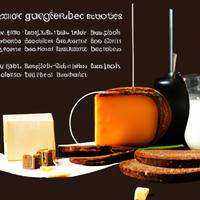
1 serving (100 grams) contains 250 calories, 10.0 grams of protein, 8.0 grams of fat, and 35.0 grams of carbohydrates.

Log this food in SnapCalorie

Nutrition Information
Calories |
595.2 | ||
|---|---|---|---|
% Daily Value* |
|||
| Total Fat | 19.0 g | 24% | |
| Saturated Fat | 9.5 g | 47% | |
| Polyunsaturated Fat | 0 g | ||
| Cholesterol | 47.6 mg | 15% | |
| Sodium | 952.4 mg | 41% | |
| Total Carbohydrates | 83.3 g | 30% | |
| Dietary Fiber | 11.9 g | 42% | |
| Sugars | 4.8 g | ||
| protein | 23.8 g | 47% | |
| Vitamin D | 23.8 mcg | 119% | |
| Calcium | 476.2 mg | 36% | |
| Iron | 4.8 mg | 26% | |
| Potassium | 357.1 mg | 7% | |
* Percent Daily Values are based on a 2,000 calorie diet. Your daily values may be higher or lower depending on your calorie needs.
Food Attributes
Source of Calories
About Rye bread with cheese
Rye Bread with Cheese is a popular pairing that highlights the robust, earthy flavor of rye complemented by the creamy richness of cheese. Rye bread, traditionally rooted in Northern and Eastern European cuisines, is typically made using rye flour, water, salt, and yeast, often yielding a hearty, dense texture and slightly tangy taste. It is naturally high in fiber, which can aid digestion, and offers a lower glycemic index compared to white bread, making it a healthier choice for balanced blood sugar levels. The choice of cheese varies, from sharp cheddar to soft Gouda, adding protein and calcium but also saturated fat and sodium, depending on the variety. Combining the two creates a satisfying snack or meal that balances nutrients and indulgence, though moderation is advised for those watching calorie or sodium intake.



